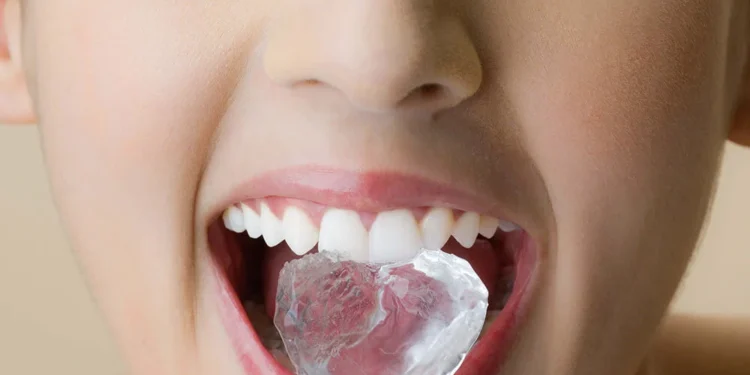Have you ever found yourself joyfully munching on ice cubes? Those little frozen treats that hide at the bottom of a tall glass of your beloved drink can be incredibly tempting. And during summer, indulging in snow cones becomes a cherished tradition. A summer without a refreshing cup of lemon ice feels like a season lost to sticky discomfort.
But here’s the catch: Chewing ice regularly may cause serious damage to your teeth if you’re not cautious.
You might be wondering about different queries: Is chewing ice bad for teeth? What harm could ice possibly do? After all, it’s just frozen water, right? Well, while ice itself is harmless.
When you chew on ice, the extreme cold and hardness of the ice can put your teeth under tremendous stress. Teeth are remarkably strong, designed to handle biting and chewing food, but they have their limits. The force exerted by crunching on ice cubes can lead to microfractures in your tooth enamel. Over time, these tiny cracks can worsen, resulting in larger fractures or even broken teeth.
Moreover, regularly subjecting your teeth to the rigors of chewing ice can also wear down the enamel. The constant grinding motion weakens the enamel, making your teeth more vulnerable to cavities, tooth sensitivity, and other dental problems. Additionally, the repetitive action of chewing ice can strain your jaw joints and potentially lead to temporomandibular joint disorder (TMJ), causing pain and discomfort in the jaw area.
So, while that satisfying crunch of ice might bring temporary relief or a momentary thrill, it’s important to be mindful of the potential risks it poses to your dental well-being. Taking care of your teeth means avoiding habits that could harm them in the long run.
Is Chewing Ice Bad For Teeth?
Indulging in the habit of chewing ice may appear harmless, except for the annoyance it can cause to those around you. However, the truth is that munching on ice cubes can harm your oral health, leading to potential dental problems and expensive visits to the dentist.
So, Why do People Chew Ice?
The medical term for craving and chewing on items with little to no nutritional value, like ice, dirt, clay, chalk, paper, paint, sand, and rocks, is “pica.” Chewing on ice is called pagophagia, and it is the most common form of pica. Interestingly, compulsive ice chewing is often associated with anemia, particularly iron-deficiency anemia.
While the exact reason why individuals with anemia feel compelled to chew ice is not fully understood, it is believed that the coolness and crunchiness of ice cubes may relieve oral inflammation, a common symptom of iron deficiencies.
A study published in Medical Hypotheses recommended that consuming ice stimulates individuals with insufficient iron, similar to the energizing effect of a strong cup of coffee. Anemics often experience fatigue and reduced mental clarity due to their bodies’ inability to produce enough hemoglobin, which carries oxygen.
Chewing ice might increase the flow of oxygenated blood to the brain, resulting in increased alertness and focus for people with anemia. Interestingly, sipping on ice water does not produce the same invigorating sensation.
Aside from anemia, there are other reasons why people chew ice. It may relieve a dry mouth, help in quitting cigarettes, serve as a stress reliever, alleviate boredom, or be an attempt to reduce food intake for weight loss purposes.
However, despite the possible reasons behind ice chewing, it is important to note that it can harm your teeth and gums. Therefore, avoiding this habit and seeking healthier alternatives for addressing the underlying causes or cravings associated with chewing ice is advisable.
Health Problems Due To Chewing Ice
Now you are clear about your search term: Is chewing ice bad for teeth? It is also important to be aware of the health problems due to chewing ice. Let’s start to discuss a few of them.
- Cracked and Chipped Teeth: Although teeth appear strong, they are not meant to withstand the force of chewing on hard and rigid objects like ice. This can result in teeth becoming chipped or cracked, which may necessitate an emergency dental visit to address the damage
- Tooth Enamel Damage: The outer layer of your teeth, known as tooth enamel, plays a crucial role in protecting them against cavities and the harmful effects of sugar and acid. Chewing ice can cause significant damage to the tooth enamel, leaving your teeth vulnerable to potential dental issues and sensitivity
- Complications with Dental Work: If you have undergone dental procedures such as fillings or crowns, chewing on hard substances like ice can be detrimental. It can cause damage to these dental restorations, leading to the need for immediate dental intervention to repair or replace them
- Sore Jaw Muscles: Chewing ice affects your teeth and puts strain on your jaw muscles. This can result in temporomandibular joint (TMJ) disorder. TMJ disorder can also cause difficulty in opening and closing your mouth properly




